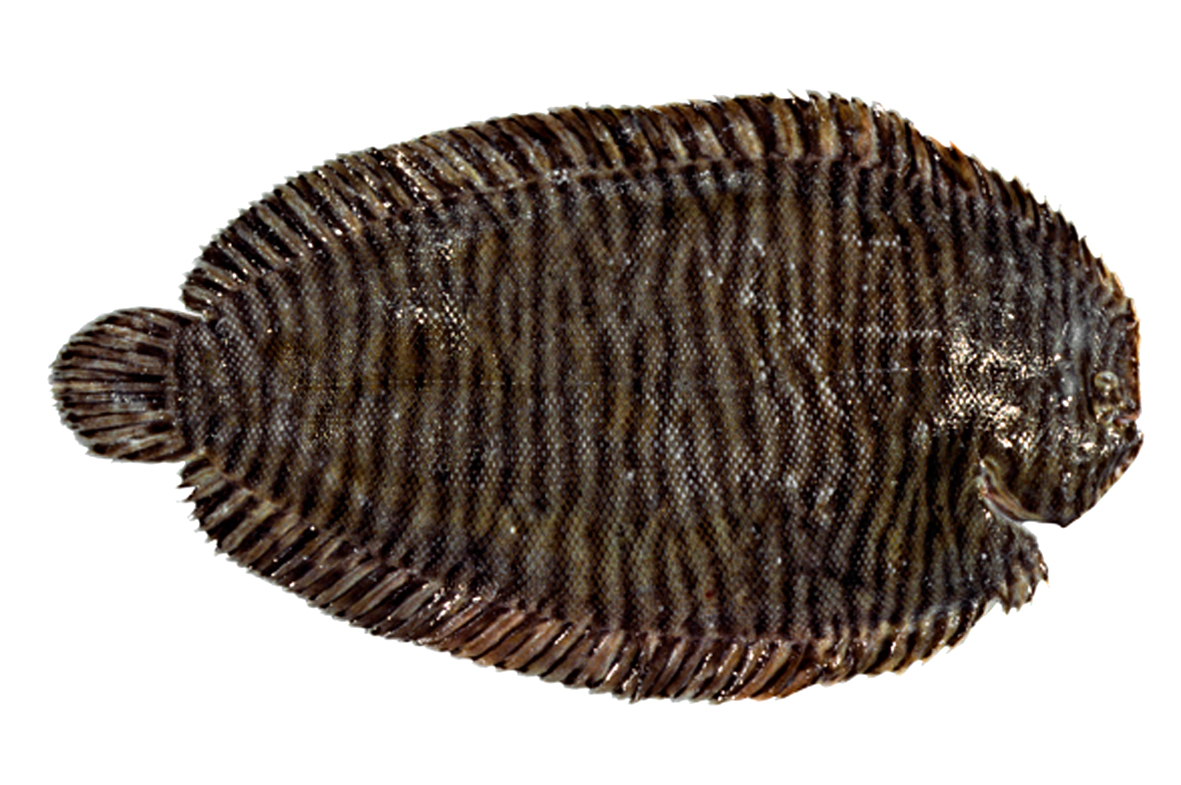- Classification
- ACTINOPTERYGII
- PLEURONECTIFORMES
- SOLEIDAE
- Synclidopus
- macleayanus
Narrowbanded Sole, Synclidopus macleayanus (Ramsay 1881)

A Narrowbanded Sole, Synclidopus macleayanus. Source: Australian National Fish Collection, CSIRO. License: CC BY Attribution-Noncommercial
Narrowbanded Sole, Synclidopus macleayanus (Ramsay 1881)
More Info
|
Distribution |
Known only from eastern Australia from the Burnett River mouth, QLD to Sydney, NSW (33°53'S); coastal species that burrows in soft sediments; adults spend winter months in moderately deep water, gradually move to shallower water in spring, some entering freshwater; mature during summer months. |
|
Features |
Dorsal fin 62–66; Anal fin 49–53; Caudal fin 18–20; Pelvic fin 5; Lateral line scales 94-113; Vertebrae 36–38. Head and body extremely compressed, ovate, body depth 2.2–2.6 in SL (38.4-45.5%). Head short and obtuse, length 4.7–5.5 in SL (18.2-21.3%). Snout not overlapping, only projecting slightly anterior to lower lip of closed mouth. Eyes small, 7.65-9.75 in HL (10.2-13%); both on right side of head; upper eye overlapping one-third to one-half of lower eye. Mouth small, reaching to below anterior part of lower eye on ocular side, mouth strongly curved on blind side; band of villiform teeth on blind side of both jaws, broader centrally. Anterior nostril of ocular side tubular, anterior to upper part of lower eye, not reaching eye when laid back; posterior nostril a slit in labial groove closer to eye. Scales ctenoid on both sides, most on body and rear of head with elongate ctenii, scales smaller anteriorly with fewer ctenii, anteriormost with short stout papillae instead; scales on blind side of head as long fleshy cirri before posterior end of jaws, stouter and more papillae-like near anterior margin of head and on fleshy sheath covering anterior part of lower jaw; scales between and on medial margins of eyes; slender cirri on opercular margin of gill opening on blind side, but not ocular side; small scales on bases of dorsal- and anal-fin rays and basal 3/4 of caudal fin. Lateral line straight on both sides along middle of body, ocular side lateral line branched on head about two eye diameters behind upper eye, upper branch angling sharply posteriorly about 8 scale rows beneath naked part of dorsal fin, continuing onto anterior portion of body, lower branch shorter, terminating behind lower eye. Dorsal-fin origin on snout anterior to ventral margin of upper eye; first ray not prolonged; first nine dorsal-fin rays on blind side with fleshy cirri; anal-fin origin below base of about fourteenth dorsal-fin ray; dorsal and anal fins not broadly connected by membrane to caudal fin, posteriormost anal-fin ray slightly anterior to base of lower caudal-fin ray; caudal fin rounded, but slightly pointed medially. Pectoral fins absent. Ocular-side pelvic fin on ventral edge of body at gill opening, last membrane broadly attached to first anal-fin ray. |
|
Size |
Reaches 28 cm TL. |
|
Colour |
Ocular side lavender grey, with 26-40, regular, well-defined narrow dark charcoal grey-brown bands usually slightly wider than whitish to pale lavender-grey interspaces, some forked, 6-7 on head and 1-2 on base of caudal fin. |
|
Feeding |
Preys on shellfish and worms living on and in substrate. |
|
Biology |
Oviparous, spawning in river mouths during summer.When yolk-sac absorbed, young move into estuaries and eventually into fresh water. |
|
Species Citation |
Solea macleayana Ramsay, E.P. (1881). Description of two new species of Australian fishes. Proc. Linn. Soc. N.S.W. (1)5(4): 462–463 [462]. Manly, Sydney, NSW. |
|
Author |
Martin F. Gomon |
Narrowbanded Sole, Synclidopus macleayanus (Ramsay 1881)
References
McCulloch, A.R. (1930). A check-list of the fishes recorded from Australia. Mem. Aust. Mus. 5(1–4): 1–534 [283]
Munro, I.S.R. (1961). pp. 1–172 [73] (505)
Whitley, G.P. (1964). [49] (1530, as Synclidopus macleayanus).
Randall, J.E. (2005). A review of soles of the genus Aseraggodes from the South Pacific, with descriptions of seven new species and a diagnosis of Synclidopus. Memoirs of Museum Victoria 62(2): 191-212 [192-193].



